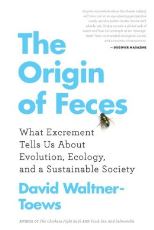The Origin of Feces
David Waltner-Toews
ECW Press, £12.99
One is drawn immediately to this book by its wonderfully whimsical title – a play on Darwin's famous paper – and the merriment does not end at the front cover. With chapters entitled Turds of Endearment and Know Sh*t: A Way Forward, there are plenty of puns, jokes and anecdotes, but the underlying message of how management of natural waste can provide a solution to environmental challenges is a serious one.
Waltner-Toews, a Canadian conservationist and epidemiologist, outlines how in nature excrement is a source of food and energy and is important in the recycling of nutrients. This holistic view of poo is at odds with its perception in today's ultra-sanitised developed societies, where it is seen as something unpleasant and which disposal of is, er, the end point.
It is argued that while substandard sanitation leads to fouling of waterways and public health concerns, faeces should be embraced on an industrial scale as a ready made source of energy. Using biodigester technology, both human and animal sewage can be digested anaerobically to make nitrogen-rich fertiliser and to produce methane to generate electricity and heat.
Importantly, this would provide a simple, cost-effective solution to the reduction of greenhouse gas emissions from farming waste. The electricity and fertiliser can be sold for profit and the heat generated reused on the farm to save money. A case of "where's there's muck, there's brass".
This book is recommended reading for all those with an environmental conscience – not just the organic composters among us.



